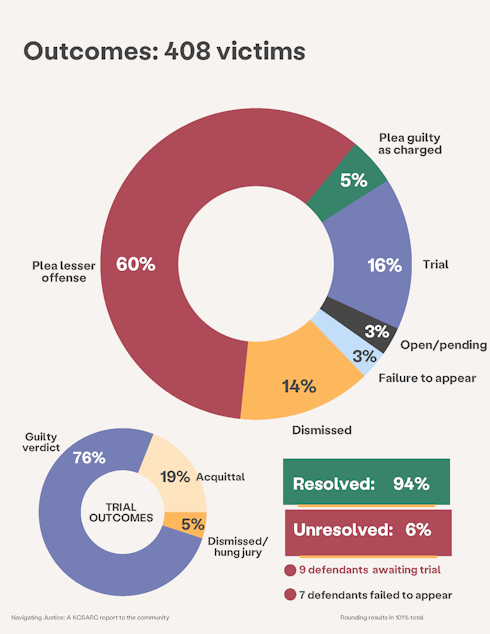Too many King County sexual assaults are pleaded down to lesser crimes, advocates say

Advocates for sexual assault survivors say King County is letting too many defendants plead guilty to lesser charges — often, to non-sex-crimes.
King County Sexual Assault Resource Center analyzed outcomes of 408 assault cases it had open at a single point in 2021, involving 319 defendants, many of which were backlogged in the legal system. Three quarters of the cases were crimes against children.
Three years later, 16% of those cases have been resolved at trial, usually with juries having returned a guilty verdict, while 14% of cases were dismissed. In the most common scenario, however — 60% of cases — the defendant pleaded guilty before trial to less serious crimes, usually to non-sex-offenses.

Kate Krug, CEO of of the county resource center, said that does not do justice to the sexual assaults their clients experienced.
“While survivors report feeling a sense of closure and relief once their cases are resolved, many of them feel that the actual harm they experienced has been minimized when they’re pleaded down, or if they're getting resolved as a non-sex-offender, because then that victim is actually ineligible for criminal sexual assault protection orders,” Krug said.
Maggi Qerimi, chair of the King County Prosecuting Attorney’s Office Special Assault Unit, said many factors contribute to sexual assault charges getting lowered, including witnesses recanting and victims wanting to avoid reliving the experience at trial.
“The vast majority of these cases, they typically have to do with evidence-based issues or issues surrounding the victim’s wishes about where that case should go, or how far that case should go,” Qerimi said. “We work very hard to prioritize victim input in every single one of those cases. We evaluate each case individually on the facts of that case.”
Thirteen of the 408 cases from 2021 are still awaiting trial, Krug said. In all but one of those cases, the victims were children.

